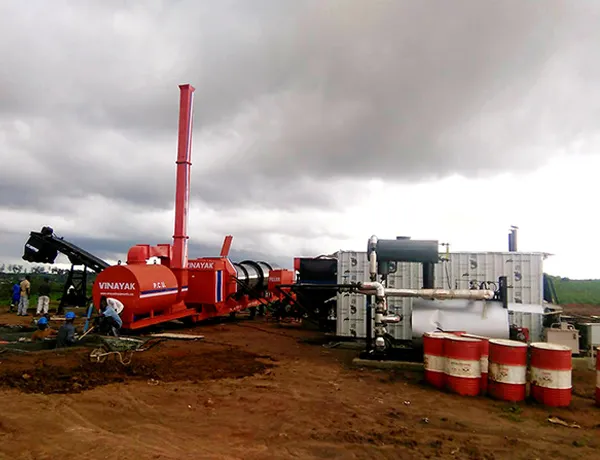We are Guyana's Largest manufacturer and suppliers of Concrete Batching Plants. A Concrete Batching Plant is a facility used to produce ready-mix concrete by combining various ingredients such as cement, aggregates (sand, gravel, crushed stone), water, and additives in precise proportions. These plants are essential for large-scale construction projects where the production of large quantities of concrete is required, such as highways, bridges, high-rise buildings, and other infrastructure works.
Our concrete batching plants incorporate the latest technological advancements to ensure optimal performance. With advanced automation systems, Vinayak Construction Equipments plants provide easy control over the batching process, allowing for precise mixing and minimizing human error. These systems also improve efficiency, ensuring that each batch of concrete is produced quickly and to the highest quality standards.

Our plants are designed to meet the specific needs of various projects, from small-scale residential construction to large infrastructure developments. With advanced technology, precise mixing capabilities, and reliable performance, our concrete batching plants ensure consistent production of high-quality concrete for foundations, roads, bridges, and more. Whether you're looking for stationary, mobile, or compact batching plants, we offer customized solutions to help you complete your construction projects on time and within budget.
Our concrete batching plants are easy to install, operate, and maintain. Thanks to their modular design, they can be quickly set up and are adaptable to different project sizes. Whether you're in an urban area or a remote location in Guyana, our mobile batching plants can be easily transported to the site, while stationary plants can be installed for long-term use. The user-friendly interfaces and control systems make it easy for operators to monitor and manage the batching process.
| Component | Specification |
|---|---|
| Production Capacity | Stationary Plant: Up to 120 m³/hour Mobile Plant: Up to 60 m³/hour Compact Plant: Up to 30 m³/hour |
| Mixing Unit | Type: Twin-shaft mixer / Pan mixer Mixing Capacity: 1.0 to 3.0 m³ per batch Mixing Time: 30-60 seconds Speed: Adjustable for homogeneous mixing |
| Weighing System | Cement Weighing: Electronic load cell-based weighing Aggregate Weighing: Load cell-based for accurate weighing Water Weighing: Digital flow meters Additive Weighing: Automatic dosing system |
| Aggregate Bins | Number of Bins: 2-4 bins Capacity: 5 m³ to 20 m³ per bin Material: High-strength steel with anti-corrosive coating |
| Cement Silo | Capacity: 50 tons to 200 tons Material: Carbon steel with anti-corrosive coating Ventilation: Pneumatic vent system Safety: Pressure relief valve, cement level indicator, dust collector |
| Control System | Type: Fully automated and manual options Software: PLC-based with SCADA or HMI control Remote Monitoring: Available User Interface: Touchscreen interface |
| Water and Chemical Dosing System | Water Flow Meter: Digital flowmeter Admixture Dosing: Automated dosing system for additives |
| Conveying System | Aggregate Conveyor: Belt conveyor Cement Conveyor: Screw conveyors Water & Additive Conveying: Pipe system with pumps |
| Dust Collection System | Type: Cyclone separator and bag filter Efficiency: 99.9% dust removal Airflow: High-efficiency system |
| Air Compressor | Capacity: 1-2 CFM Function: Pneumatic system operation (valves, dust collectors) |
| Dimensions and Mobility | Stationary Plants: Fixed installation Mobile Plants: Trailer-mounted for easy transport Compact Plants: Space-saving design |
| Safety Features | Emergency Stop: Available at critical points Overload Protection: Prevents mechanical damage Fire Extinguisher: On-site emergency equipment Vibration Monitoring: Sensors for abnormal vibration detection |
| Electrical System | Voltage: 415V / 50 Hz (customizable) Control Panel: Fully enclosed Backup Power: Optional integration with backup systems |
| Optional Features | Recycling System: Water recycling system integration Hot Mix Option: For asphalt production Batching Plant with Built-in Concrete Mixer: For ready-mix concrete transport |